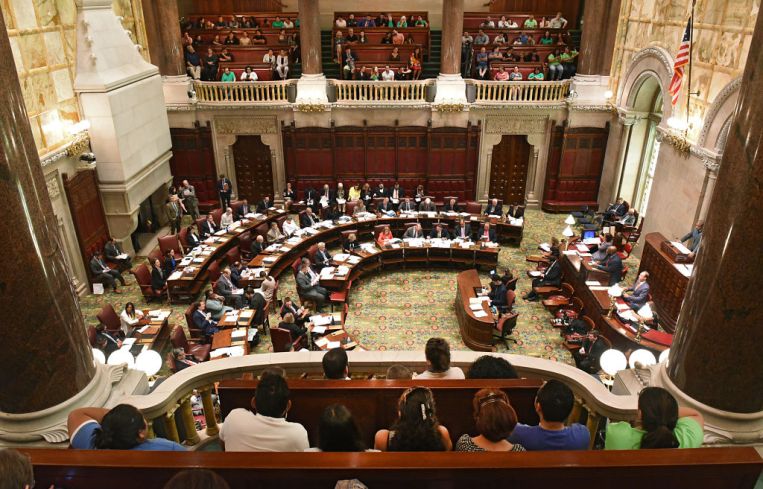NY State Senate Budget Pushes Office-to-Resi Conversions, Denser Development
By Rebecca Baird-Remba March 12, 2024 3:16 pm
reprints
The New York State Senate has put out its wish list of housing proposals in its one-house budget document released late Monday. The list includes $250 million for a new housing voucher program, an incentive and financing program for accessory dwelling units, $40 million in grants to help bring rent-stabilized apartments up to code, limited proposals for lifting the floor area ratio (FAR) cap, and incentivizing office-to-residential conversions.
However, the budget resolution notably omits a new version of the 421a tax exemption, which city housing officials and real estate developers have awaited with bated breath since the residential construction tax break expired in June 2022.
The legislative body writes that it would consider a new tax exemption for development only if it included more affordable housing and fair wages for workers involved in construction and building operations. Politico New York reported last week that the Real Estate Board of New York and the building trades unions had finally struck a deal on a wage floor of $40 an hour, but officials on both sides told the publication that the number was more of a starting point for wage negotiations.
The Democratic-controlled Senate notes in its proposed budget that it is “open to further discussing the creation of a tax exemption for new multifamily construction in New York City that includes deeper affordability requirements, strong transparency and compliance provisions, and living wages for construction and building service workers, as part of a comprehensive housing package that includes the core principles of Good Cause Eviction. The Senate is also open to further discussing an extension of the 421a tax exemption completion deadline for projects already vested in the program as part of a comprehensive housing package that includes tenant protections.”
The body supports lifting the FAR cap for New York City, which limits the size of a building to 12 times the size of its lot, though only in certain cases. The measure would apply to properties that get a city- or state-approved rezoning for a higher FAR and include affordable housing as required by the city’s Mandatory Inclusionary Housing (MIH) program. Those properties also cannot be located in a historic district.
Tucked into the budget document is also a new proposal for a tax exemption to incentivize commercial-to-residential conversions in the five boroughs. Projects would have to include a certain amount of affordable housing. Developers of conversions would need to set aside at least 25 percent of their units as affordable housing, with 5 percent of apartments renting to people earning no more than 40 percent of the area median income (AMI), or $50,840 for a family of three. The income bands for the affordable units could not have a weighted average of more than 80 percent AMI ($101,680 for a family of three), and units could not rent to incomes above 100 percent AMI ($127,100 for a family of three).
The Senate also reiterated its support for strong tenant protections, namely Good Cause Eviction, which would cap rent increases to the rate of inflation and limit the circumstances under which landlords can evict a tenant.
As for the voucher program, senators propose a new state-funded housing voucher program — similar to the federal Section 8 program — that would cover rent on an apartment for low-income New Yorkers who are leaving the shelter system or at risk of eviction.
Rebecca Baird-Remba can be reached at rbairdremba@commercialobserver.com



